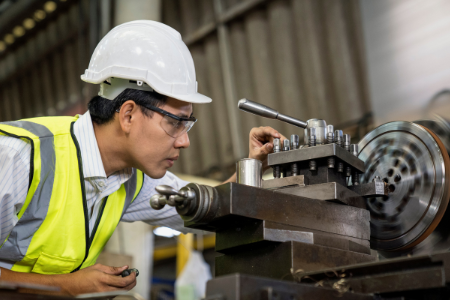Introduction
The manufacturing industry is undergoing a major transformation, driven by advancements in automation, robotics, and smart production systems. As industries embrace Industry 4.0, the demand for skilled engineers—including automation engineers, mechanical engineers, process engineers, and controls engineers—is reaching new heights.
From automotive plants to electronics production, manufacturers are integrating AI-powered automation, IoT connectivity, and advanced robotics to improve efficiency and reduce costs. This rapid evolution is creating exciting opportunities for engineering professionals looking to drive innovation in modern manufacturing.
Key Trends Reshaping Manufacturing
1. Smart Factories & Industry 4.0
Manufacturers are adopting IoT-enabled sensors, cloud computing, and AI-driven automation to optimize production lines and increase productivity.
2. Robotics & Automation
The integration of collaborative robots (cobots), automated assembly lines, and AI-controlled machinery is streamlining operations and reducing human errors.
3. Sustainable & Green Manufacturing
Eco-friendly processes such as energy-efficient production, waste reduction, and sustainable material sourcing are becoming industry standards.
4. Advanced Materials & 3D Printing
Breakthroughs in composite materials, lightweight alloys, and additive manufacturing are transforming product design and prototyping.
In-Demand Engineering Roles in Manufacturing
1. Automation Engineers
Develop and maintain robotic systems, AI-driven manufacturing processes, and smart factory automation.
2. Mechanical Engineers
Design and optimize production equipment, assembly systems, and mechanical components for high-performance manufacturing.
3. Process Engineers
Improve manufacturing workflows, minimize waste, and enhance production efficiency through innovative process design.
4. Controls Engineers
Implement and manage PLC programming, industrial control systems, and machine automation for seamless operations.
The Future of Manufacturing Engineering
The next decade will see a significant shift toward digitalization and automation in manufacturing, with:
- AI & Predictive Maintenance: Machine learning models analyzing data to predict equipment failures before they happen.
- 5G & Connected Manufacturing: High-speed wireless networks enabling real-time monitoring and remote control of factory equipment.
- Human-Machine Collaboration: Increased use of cobots to assist workers in complex tasks.
- Sustainable Production Practices: Companies striving for zero-waste manufacturing and carbon-neutral production facilities.
How to Advance Your Career in Manufacturing Engineering
- Stay Ahead of Emerging Technologies: Keep up with automation, robotics, and digital manufacturing trends.
- Develop Hands-On Expertise: Gain experience with PLC programming, CAD software, and smart factory integration.
- Work with a Specialized Staffing Agency: Vaca Staffing connects top engineering talent with leading manufacturers.
Conclusion
The manufacturing industry is evolving rapidly, creating a surge in demand for skilled engineers and automation specialists. As factories become smarter, greener, and more efficient, professionals who embrace these advancements will find limitless career opportunities.
At Vaca Staffing, we specialize in matching engineers with top employers in the manufacturing sector. Looking for your next career move? Contact us today! ⚙️

